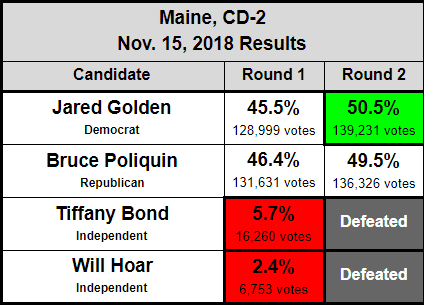
From Fair Vote
TAKOMA PARK, Md. — In the first congressional race in American history to be decided in a second round of counting with ranked choice voting (RCV), Democratic challenger Jared Golden was declared the winner over Republican incumbent U.S. Rep. Bruce Poliquin today in the campaign for Maine’s 2nd District.
No candidate crossed 50 percent during the first round, with both candidates earning 46 percent of first choices. Unlike the state’s ranked choice voting contests for U.S. Senate and the 1st Congressional District, which were decided based on votes in the first round, an RCV tabulation was necessary to decide the outcome. In the instant runoff tally that matched Golden directly against Poliquin, Golden received 139,231 votes (51 percent), while Poliquin garnered 136,326 (49 percent).
Golden’s second-round victory came by earning more than two-thirds of the votes in the instant runoff from those backers of the independent candidates, Tiffany Bond and William Hoar, who ranked Golden or Poliquin second. Those candidates had publicly indicated Golden as their preferred backup choice.
“This is exactly the way ranked choice voting empowers voters,” said Rob Richie, FairVote president and CEO. “The voice of every voter should matter. We now know which candidate most 2nd Congressional District supporters want to represent them in Congress for the next two years.”
The results show that voters in the 2nd District handled the ballot well, a testament to the fact that ranked choice voting is easy. Only 0.18 percent of voters who voted in the race made an error that invalided their ballot, which means that more than 99.8 percent of 2nd District voters cast valid ballots. For many voters, this was their first-ever ranked choice voting election.

In addition, 65 percent of backers of the independent candidates used their freedom to rank at least one of the major party candidates as a backup choice, with Golden earning 69 percent of those votes to Poliquin’s 31 percent. The “dropoff” in active votes between the first round and the second round was less than 3 percent, far lower than the average decline in turnout of nearly half of first-round votes (47 percent) in congressional primary runoffs this year.
While Maine does not have an automatic recount law, a candidate may request one. FairVote last year issued a report on every statewide recount in the nation from 2000 to 2015. Staff attorney David O’Brien commented, “A recount is extremely unlikely to reverse the outcome given Golden’s margin of victory. With a difference of 2,905 votes — just over one percent of the total — Poliquin would need votes to shift to him in vastly greater numbers than seen in the statewide recounts that FairVote has examined.”

Leave a Reply